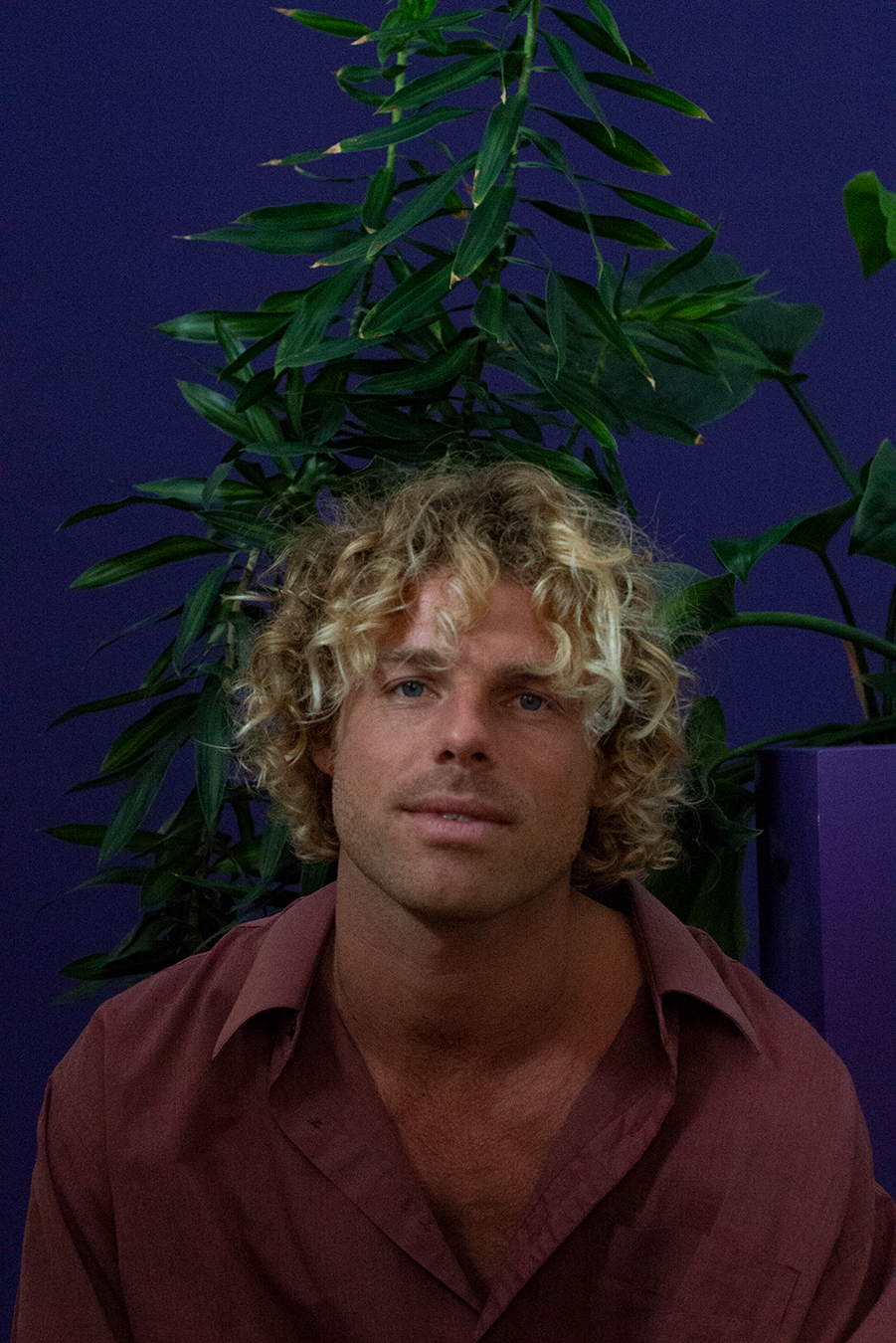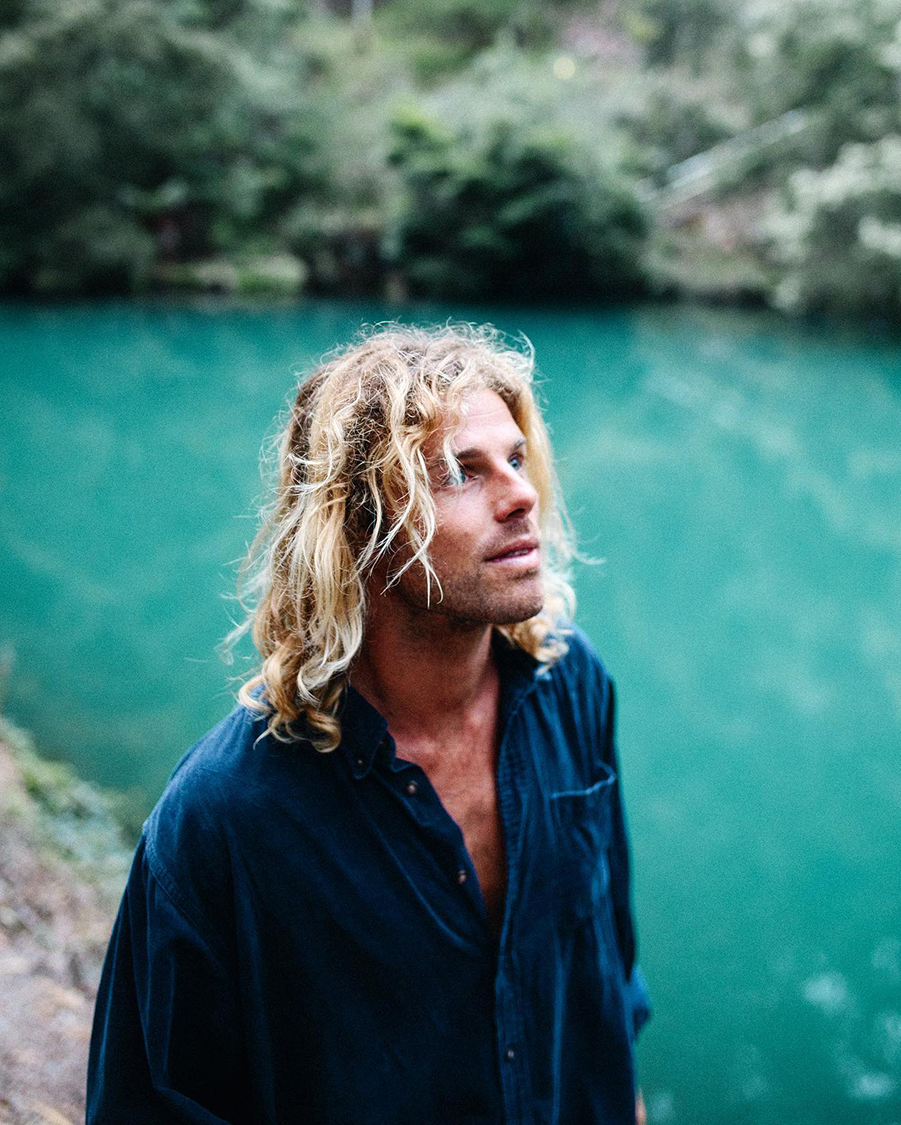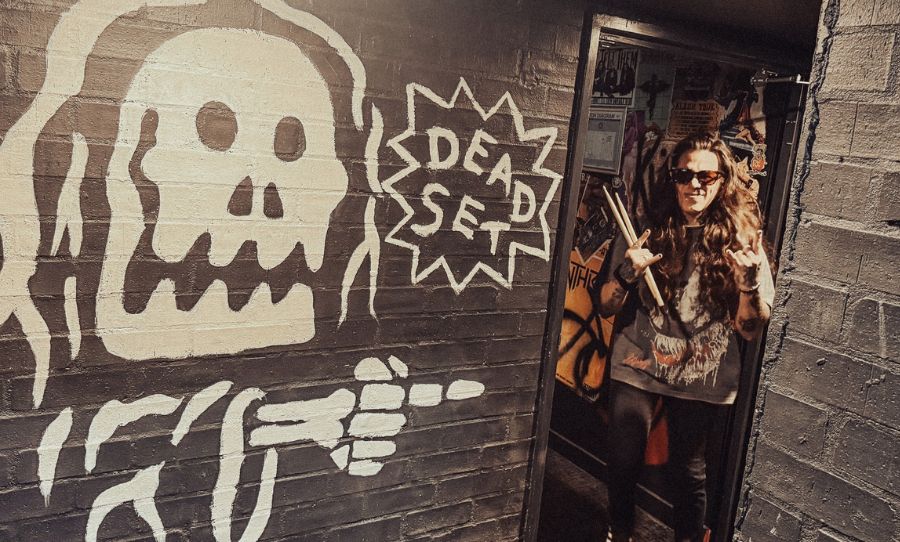Everything about Kim Churchill is holistic; his art, his way of life, his outlook. He approaches everything he does with a defining awareness about the world and his place in it, it shows through his music. Soft and poignant, no matter where you listen to a Kim Churchill song, you will always be left feeling richer just by being in its presence. Yet, the road to this point in his life was one of much trial and error.
Fresh off the release of his new single Outta Love, we sat down with Kim to chat through the journey, the music, and the road forward.
HAPPY: So, Out Of Love is the new track on your upcoming EP, The End, and it’s out on October 9th. It’s as sad as it is honest. Out Of Love, you said it represents the painful truth and difficult path one must face when they choose to leave a relationship. Can you elaborate on that a little for me?
KIM: Yeah, it’s a brutal song. I had to write it. I’d been with my partner for a long time and I realised that I just had nothing left to give the relationship and I hadn’t for quite a while. I wrote that song because I had to, I just had to say it out loud. One thing I remember, when I was a kid, was that I went into this house and there was a book on the coffee table, it was Songwriting for Dummies. I read the first page and, literally, the first thing it said was the songwriter should never show themselves in a bad light within the song, which is bullshit, but an interesting rule of thumb.
You broke my heart, you’re all sweet, and for me, I think I did really struggle to… I always like to try to reach into myself and find something so me that it’s almost painful: it almost makes me cry to say it out loud. That was the thing that I needed to say out loud, that I was out of love and I had nothing left to give. I had to own that, sometimes that happens to two people. Actually, it happens all the time and in all sorts of relationships. There’s all kinds of ways that people can avoid it and avoid just actually saying it. And, at the end of the day, I realised that, for me, to grow and to feel capable as a human, capable of owning and understanding and communicating my emotions in a respectful way, I had to say that. And I guess, because I’m a songwriter, the song followed suit.
HAPPY: In my head, this is what I imagine about Kim Churchill. I can see you surfing, I can see you sitting in the back of your van playing acoustic guitar, looking out at the waves and stuff. I’m wondering, does a ride or die partner or companion come into that equation? Because you’re living the life of a nomad.
KIM: I know, that’s the thing. I think I choose to live on the fringes a lot and it’s very hard to dabble in normality. I struggle with that a bit. I spend most of my time in beach car parks. I literally do. It’s cool, it’s great, I find it liberating. I find a lot of strength and excitement and a lot of creativity in it. And the realities of that situation are that you spend a lot of time on your own.
HAPPY: You’re saying sometimes that you need people for your energy and sometimes you get your energy just from yourself. When you get your energy just from yourself, you often find that you find companions and they’re taking a little bit of that energy. They love it.
KIM: They love it, absolutely.
HAPPY: I’m assuming that in this relationship that you’ve been writing about, did you feel you just needed to take yourself back a little bit?
KIM: I think when two people are in a relationship, they’re moving together. They both want to move independently of one another, but they both want to stay together. It’s this kind of dance that’s involving compromise and there’s space that can be created, and sometimes that’s important and coming back together and all that. But sometimes, two people just actually get to the point where they have drifted. They’ve tried to be together and that’s led them both to awkwardly dance off to the left, you know?
HAPPY: You’ve danced in a way that you’re both not particularly comfortable with.
KIM: Exactly, and that’s what had happened and I needed to get back to living in my van and the weird isolated, very off the grid thing I was doing. I desperately needed that. I was beginning to feel enormously exhausted from everything and that’s what I went back to doing… I went back to wandering into the bush with a backpack and a gas cooker, and some pots and pans and some watercolour paints, and a ukulele.
HAPPY: And the pots and pans are like making a rhythm and you’re like Dick Van Dyke.
KIM: Yeah, I can hear something in this.

HAPPY: Tell me how the recording process happens in that, because you must at some point stop off somewhere and record this material?
KIM: Yeah, a bit like that. So, the process I’m in right now was rather arduous, but it’s been fun. There’s four EPs that go together, 27 songs under the title I Am Forgetting The End Again. And then each one of those EPs was recorded in a different location. I Am was recorded in Berlin, Forgetting was recorded on Vancouver Island, The End was recorded in the Blue Mountains, and Again was recorded in Devon.
HAPPY: Devon, UK?
KIM: Yeah, and they’re all really intimate, favourite parts of the world for me. That different format of recording and releasing was really suitable because I would go travelling, I would explore these places, and, at the end, I would go into a studio and I would record the music. Each part of the process kind of had its own flavour and its own inspiration, and I took my mate Connor Rancan, who’s a cinematographer, with me.
HAPPY: He’s a surfer too?
KIM: Yeah, and I took him well and truly off the grid.
HAPPY: You mentioned earlier that you’d actually built a stage onto your campervan?
KIM: Yeah.
HAPPY: This is kind of your house, right? To a degree, or has been for a while. So, this is your baby, you keep on building on that.
KIM: I have a friend who grew up in Jervis Bay and he has a company down there, Undercover Creative, that fit out campervans. He’s one of my best mates. He would just see me and this van and he’d be like Kim, you’ve got the sickest van. He helped me set up the van and build a stage into it.
HAPPY: And with COVID happening, I am wondering if the idea of going off-grid is resonating with lots of people. I wanted to ask if you’re finding more and more people like yourself as you travel?
KIM: Actually yeah, I have been. I’ve been getting back to my roots a little bit as well. I was sort of deep in the world of trying to get big, trying to get as big as I could. And now, it’s a bit more just trying to get back to myself. I’m finding lots of artists that love the idea of playing on a campervan stage, like Milky Chance! They’re a big artist but are frothing to come out and play on the campervan stage. Loads of people want to do it, it’s really interesting.
HAPPY: That’s awesome, you could do your own podcast or something?
KIM: I have been working on a podcast.
HAPPY: I would tune into that for sure.
KIM: Yeah, I’ve been working on it and I do have ideas for it that I’m chipping away at. I’m finding there is a little world. I really like the idea of doing a tour of shows in the morning, working with tourism boards and doing it in this beautiful natural environment, playing a show at 8:00 in the morning, where people just bring breakfast. It’s just stuff like that.
HAPPY: You always associate music with alcohol and booze and clubbing and stuff. That’s not necessarily a good thing for a lot of musicians either, in terms of their mental health.
KIM: Well that’s it. It’s something that I’ve struggled with. I have to be really diligent with my mental health because I’m the one that ends up power-spewing in the gutter at 4:00 in the morning. That’s who I am, I’m a lightweight. He cannot go all out but he does and he ruins himself through it. Realistically, the touring lifestyle, for me, has been one of an insane amount of discipline, meditation and yoga and stuff like that.
Getting into the habit of reading books and getting into the habit of catching up with friends for breakfast, as opposed to all of this stuff that, naturally, the world encourages you to do. Which is, you’re at a bar, everybody’s getting drunk. There’s 300 to 400 people that love you, that are there, that want to get drunk with you and there’s a bottle of whiskey and a case of beer backstage. You’re not finished until 2:00 and you have a crew there that are doing the hard work for you. All you have to do is get drunk and play. But it’s very self-destructive.

HAPPY: I think that that’s kind of the catch. Can you cop it and is that the place where your music and your creativity actually comes from? I get the sense that isn’t for you, or you’ve reprogrammed yourself. Who knows, it’s not like you get your energy from pain and struggle. It seems like you’re getting your material from this whole project. Your van, your life, your music.
KIM: Yeah, the pain and the struggle are inevitable I reckon. But I look at some bands and I fully get it, I get how they’re driven and inspired by durries and lines of coke at 5:00 in the morning. But for me, that actually drains me.
HAPPY: Just to wrap things up, you briefly touched on that process of working on oneself. You realise that you love writing music, you love your fans appreciating it but you’re not really doing it for fame or instant gratification. I think that a lot of artists, at some point, do have this realisation that they’re doing music for some other reason and it’s more about a connection with themselves and with other people. The people they collaborate with, the musicians that they play with. What do you think about that?
KIM: I think it’s like, I’ve come full circle. I started out this way where I was busking, I was really happy busking and playing small concerts. I was really happy doing that, and then ambition set in. I chased that ambition to its extremes and just realised that what it brought me was enormous amounts of stress and anxiety. I prefer to have an internal focus of evaluation. Can I be honest? Am I being honest and I value honesty, so I have control over that. Fame, I have no control over that.
So, my self-worth is just getting thrown around like a bag in the wind because one second you’re a big deal, the next second you’re not and you don’t actually have an enormous amount of control over that. Your best work will not necessarily be your most popular work and beyond that, the other things that were happening to me in the pursuit of superstardom… very anxious around my art, very fearful, sort of acting from a basis of fear quite a lot and that is so destructive to art. I don’t think even the most phenomenal piece of art should be considered any more important than that artist’s stir fry that they made that night. I genuinely think that is how those phenomenal pieces of artwork come about, is because that person cares no more for that artwork, than they do for their stir fry.
HAPPY: That’s interesting, I remember seeing John Lennon when a reporter came to his house and he’s like, “it’s just money for rope, man.” This stuff just comes out of me and it’s no more important and I think that that is true. You can’t be going out trying to chase, you kind of just have to let it happen.
KIM: If you feel like the success of a piece of art will determine your worth as a human, you’re a really messed up, little kiddie. I think that, for me, was the realisation. With the success that I’ve had with my career and with the failure that I’ve had in my career, not only were some of my most unhappy times my most successful. That’s real, but also it’s never-ending. You’re playing to 10 people and you have a lovely gig, and you love it, then you play to 100 and have a lovely gig and you love it. And then 1,000 and then 10,000. What I began to realise was there is no point where, if your attitude is more, more, more, there’s no point where you’re genuinely there. You’re always fighting to get there, it’s like you’re constantly swimming upstream. I just decided to just swim off in the other direction and just enjoy it, other than making a living, making enough money to survive and to have a quality of life is important. When you’re really driven to succeed and become famous in the music industry, you spend all of your money on it.
When looking at European tours, they’ll be like, “we can either lose $50,000, $7,000 or $43,000, but we’ll make it back somehow and be huge.” I guess the light I have to shed on that is just that, in reality, there are much more personal and autonomous ways to see your self worth and to have control over what you believe is valuable in yourself. You have to have a sense of, “I’m no better than anybody else.” This allows so much more artistic growth. The fame, the fortune, goddamn, it literally does not make you happy. We all think it will and it’s so hard, but my experience with it is that it literally has nothing to do with happiness.
HAPPY: Kim Churchill, thanks you so much for joining me today.
KIM: Such a pleasure, bro.
Grab your copy of Outta Love here
Studio Images by Nic Mckenzie
Intro by Emily Elvish



